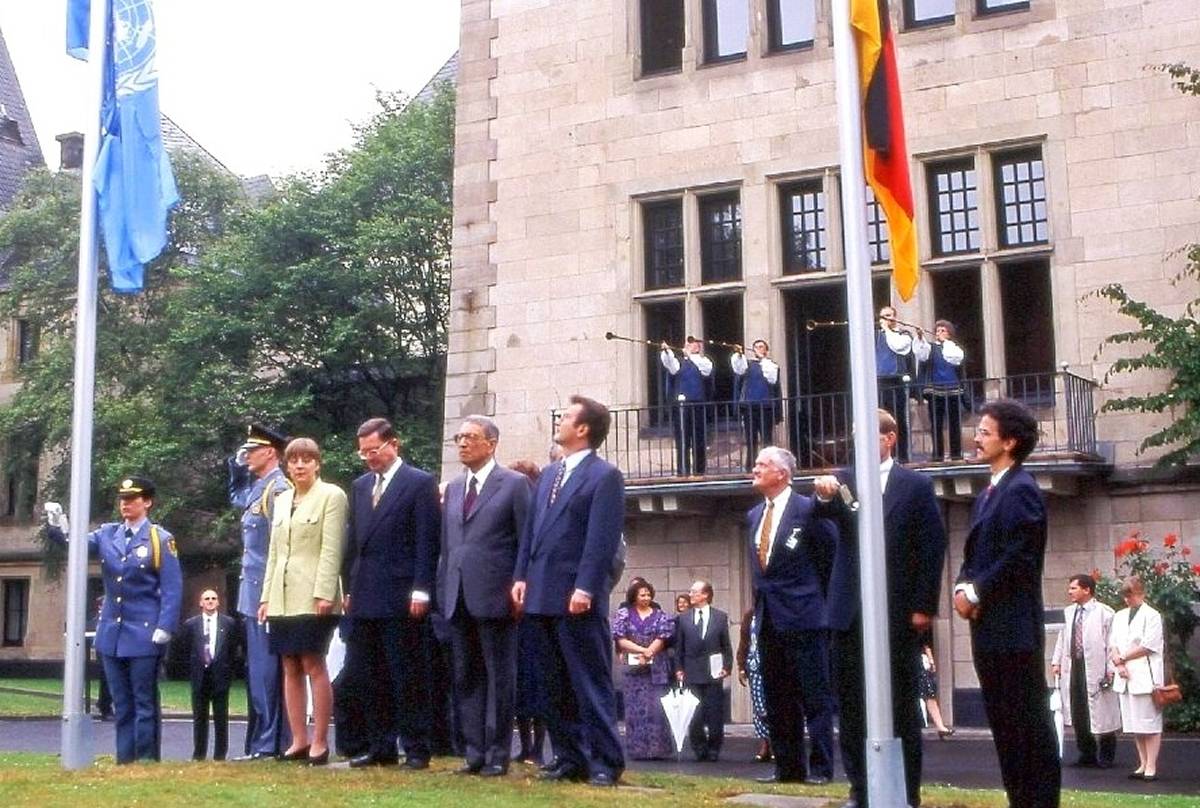25 years as a UN city First unity, then saving the environment
Bonn · In June 1996, the establishment of the Volunteers programme laid the foundation for Bonn as a United Nations city. Angela Merkel was present as Federal Environment Minister.
A different kind of historical revision: It was 20 June 1996 - ironically the fifth anniversary of the decision to move Parliament and parts of the government to Berlin - when a few people joined for a group photo beside the UN flag in the park at Haus Carstanien in Plittersdorf. Far left: A certain Angela Merkel as acting Federal Minister for the Environment, alongside Development Minister Carl-Dieter Spranger and Federal Foreign Minister Klaus Kinkel as well as UN Secretary-General Boutros Boutros-Ghali. The fact that the slightly wet spring day 25 years ago would usher in a new era for Bonn was initially indicated most of all by the fanfare on the balcony in the background. It was to take several more years before politicians and the population of Bonn were able to grasp the implications - even though the Bundestag resolution in favour of Berlin had already mentioned the establishment of international and supranational institutions in Bonn.
“At the time, this was a formulation that was already very far-sighted and behind which there were already certain ideas, but which were not yet really tangible,” remembers Monika Hörig, who was at the time still the deputy spokesperson for the city. However, Mayor Bärbel Dieckmann succeeded in moving step by step along the well-oiled political course set by predecessor Hans Daniels and Rhine-Sieg District Administrator Franz Möller. A visit to Geneva and a return visit to Bonn are still vivid memories for Hörig: “Everyone from the porter to the management came on board to have a look around Bonn. We showed Bonn as it is. And at the École de Gaulle-Adenauer, the children greeted the delegation in their different mother tongues. Bonn had therefore appeared on the UN map.” What began with the UN Volunteers (UNV) and the Climate Secretariat has now manifested itself in the form of 24 organisations and units with around 1,000 employees in Bonn - not counting relatives and the businesses that benefit from the UN as clients.
Other UN agencies in Bonn include the Secretariat for the Conservation of the Populations of European Bats, the Secretariat for the Conservation of Small Cetaceans in the North and Baltic Seas, the European regional office of the World Health Organisation (WHO) and the UNESCO International Centre for Vocational Education and Training.
The first point of contact for the United Nations in Bonn is Stefan Wagner, who has been with the city since 2000 and has been Head of the Office for International Affairs since 2013. He has helped shape the expansion of the Secretariats on the Rhine as well as the founding of the ‘UN Campus’ with the Langer Eugen at its centre. “To see how this familiar building from the news became the prominent headquarters of the UN was quite impressive,” he says. According to Wagner, who was born in the German city of Ravensburg, the good cooperation between the city, the state, the federal government and the United Nations is certainly at the core of the success. Are there unforgettable moments for him? “Certainly the visit of Ban Ki-Moon to the Old Town Hall,” says Wagner.
He sees his task essentially as continuing to establish the city as a good host and as an interface with the Secretariats and the Foreign Office, and in bringing the UN and its issues, such as biodiversity, to the city and making it a flagship. Just like during the World Climate Conference almost four years ago. “Here, beyond the protocol events, it was shown what the UN actually means to Bonn, which also enables the citizens to identify with it in a tangible way,” he says.
Which is not so easy with an organisation that has surrounded itself with a big fence. The background to this was the devastating attack on the UN in Baghdad in 2003 and, compared to the original plans, had turned out to be more filigree, said Hörig - in her view, a sign of transparency and permeability. Wagner is convinced that the impression of a “parallel world” is deceptive. Even if Bonn, he says, in competition with other UN locations such as Vienna, Geneva or New York, is not necessarily the “first choice” for staff from all over the world, and a short stay does not immediately create a sense of home: Many employees appreciate the short distances and the versatility of Bonn and are interested in city life, for example if you think of the ‘Over the Border’ festival. In other respects, too, it remains a task for the city to offer leisure and cultural activities aimed at the international community, he says.
And what about expansion opportunities with the 50th anniversary? “It's all a question of possibilities, growth remains welcome,” says Wagner. The fact that the United Nations has positioned its discussion platforms for the world's pressing issues - such as climate and the desert - in Bonn is certainly forward-looking, believes Monika Hörig. The competition for locations has not become easier since 1996 and poaching institutions has turned out to be a “budding hope”, she says. In stark contrast to Bonn's historical significance: Following the completion of German unification, the next big task given to the city was saving the environment.
(Original text: Rüdiger Franz, Translation: Caroline Kusch)




